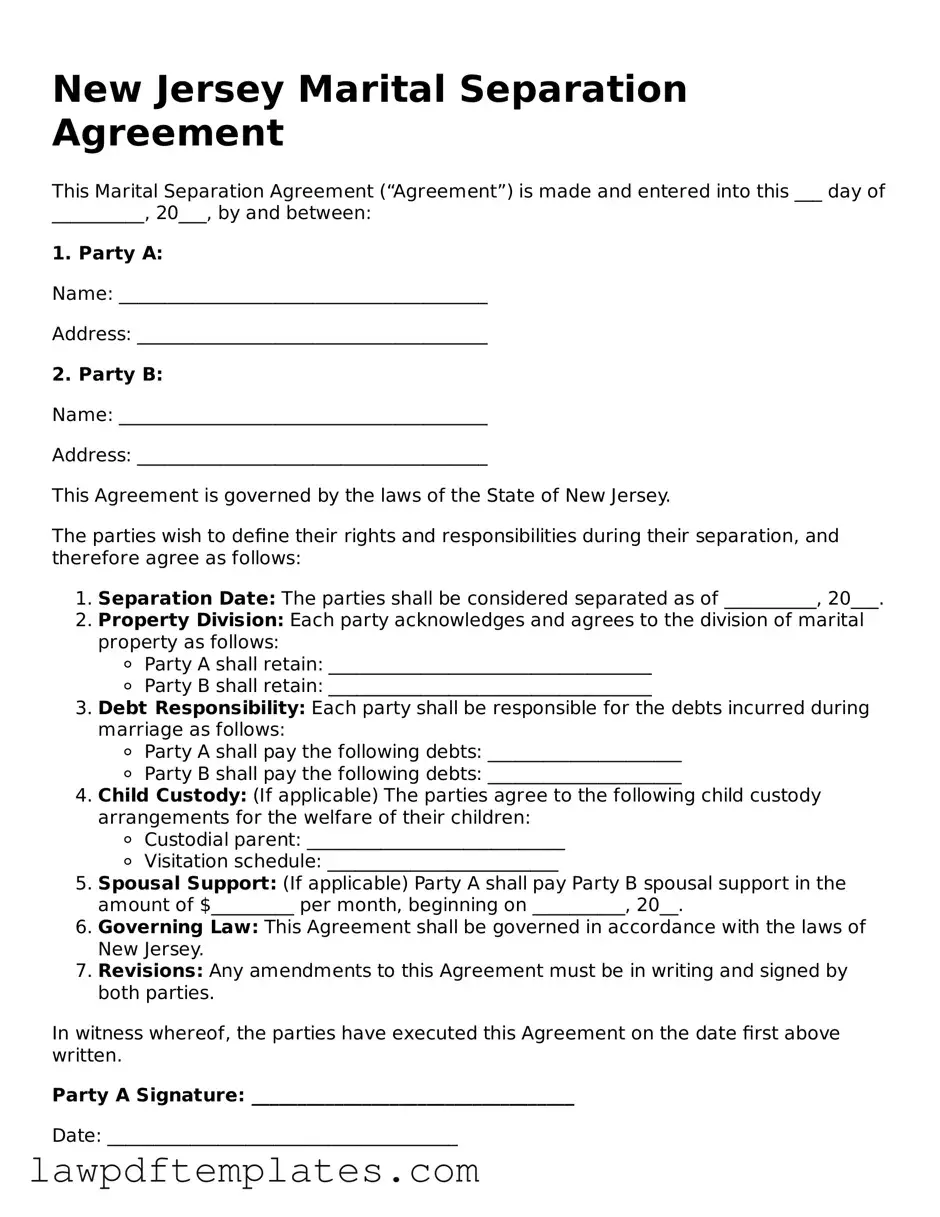Free Marital Separation Agreement Template for the State of New Jersey
Form Breakdown
| Fact Name | Description |
|---|---|
| Definition | A New Jersey Marital Separation Agreement is a legal document that outlines the terms of separation between spouses. |
| Governing Law | This agreement is governed by New Jersey state law, specifically under the New Jersey Statutes Annotated (N.J.S.A.) Title 2A. |
| Purpose | The primary purpose is to address issues such as asset division, child custody, and support obligations during the separation period. |
| Voluntary Agreement | Both parties must voluntarily agree to the terms outlined in the separation agreement. |
| Not a Divorce | A marital separation agreement is not a divorce; it is a temporary arrangement until a final divorce is granted. |
| Enforceability | Once signed, the agreement can be enforced in court, provided it meets legal requirements. |
| Modification | The terms of the agreement can be modified if both parties consent to the changes in writing. |
| Child Support | Child support provisions must comply with New Jersey's child support guidelines to be enforceable. |
| Legal Advice | It is advisable for both parties to seek independent legal counsel before signing the agreement to ensure their rights are protected. |
Sample - New Jersey Marital Separation Agreement Form
New Jersey Marital Separation Agreement
This Marital Separation Agreement (“Agreement”) is made and entered into this ___ day of __________, 20___, by and between:
1. Party A:
Name: ________________________________________
Address: ______________________________________
2. Party B:
Name: ________________________________________
Address: ______________________________________
This Agreement is governed by the laws of the State of New Jersey.
The parties wish to define their rights and responsibilities during their separation, and therefore agree as follows:
- Separation Date: The parties shall be considered separated as of __________, 20___.
- Property Division: Each party acknowledges and agrees to the division of marital property as follows:
- Party A shall retain: ___________________________________
- Party B shall retain: ___________________________________
- Debt Responsibility: Each party shall be responsible for the debts incurred during marriage as follows:
- Party A shall pay the following debts: _____________________
- Party B shall pay the following debts: _____________________
- Child Custody: (If applicable) The parties agree to the following child custody arrangements for the welfare of their children:
- Custodial parent: ____________________________
- Visitation schedule: _________________________
- Spousal Support: (If applicable) Party A shall pay Party B spousal support in the amount of $_________ per month, beginning on __________, 20__.
- Governing Law: This Agreement shall be governed in accordance with the laws of New Jersey.
- Revisions: Any amendments to this Agreement must be in writing and signed by both parties.
In witness whereof, the parties have executed this Agreement on the date first above written.
Party A Signature: ___________________________________
Date: ______________________________________
Party B Signature: ___________________________________
Date: ______________________________________
Witness Signature: ___________________________________
Date: ______________________________________
Common mistakes
Filling out the New Jersey Marital Separation Agreement form can be a challenging task. Many people make common mistakes that can lead to delays or complications in the separation process. One frequent error is not providing complete information. It’s essential to fill in all required fields accurately. Incomplete forms can result in rejection or requests for additional documentation.
Another mistake is overlooking the importance of clarity. When describing terms such as asset division or child custody, vague language can create confusion later on. Clear and specific terms help both parties understand their rights and obligations, reducing the likelihood of disputes.
Some individuals fail to consider tax implications of their agreements. It’s important to understand how asset division and alimony can affect taxes. Consulting with a tax professional can provide valuable insights and help avoid unexpected financial consequences.
Additionally, people often neglect to review the agreement thoroughly before signing. Taking the time to read through the entire document ensures that all terms are understood and agreed upon. This step can prevent future misunderstandings and legal issues.
Another common mistake is not seeking legal advice. Even if both parties feel amicable, having a lawyer review the agreement can provide protection and ensure that all legal requirements are met. Legal professionals can offer guidance on rights and responsibilities that individuals may not be aware of.
Some individuals also make the error of assuming verbal agreements are sufficient. Any agreements made verbally should be documented in writing. Relying solely on verbal commitments can lead to disputes down the line, as memories may differ.
Finally, people sometimes forget to update the agreement as circumstances change. Life events such as job changes, relocations, or changes in child custody arrangements may require modifications to the agreement. Keeping the document current is crucial for reflecting the current situation accurately.
Discover More Marital Separation Agreement Templates for Specific States
Separation Agreement Template Georgia - The agreement can help prevent disputes over shared property and finances.
For those looking to navigate the complexities of an RV sale in Texas, utilizing the Texas RV Bill of Sale is imperative, and for convenience, you can access a well-prepared format through PDF Documents Hub to streamline your transaction.
Legal Separation in Michigan - Addresses the status of any joint taxes or filings.
Sample Separation Agreement Massachusetts - This document can support emotional stability by providing a clear framework during a tumultuous time.
Separation Agreement California Pdf - A document outlining the terms of separation between spouses.
